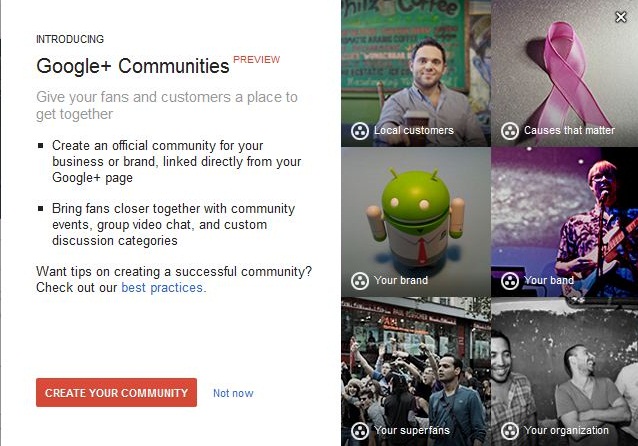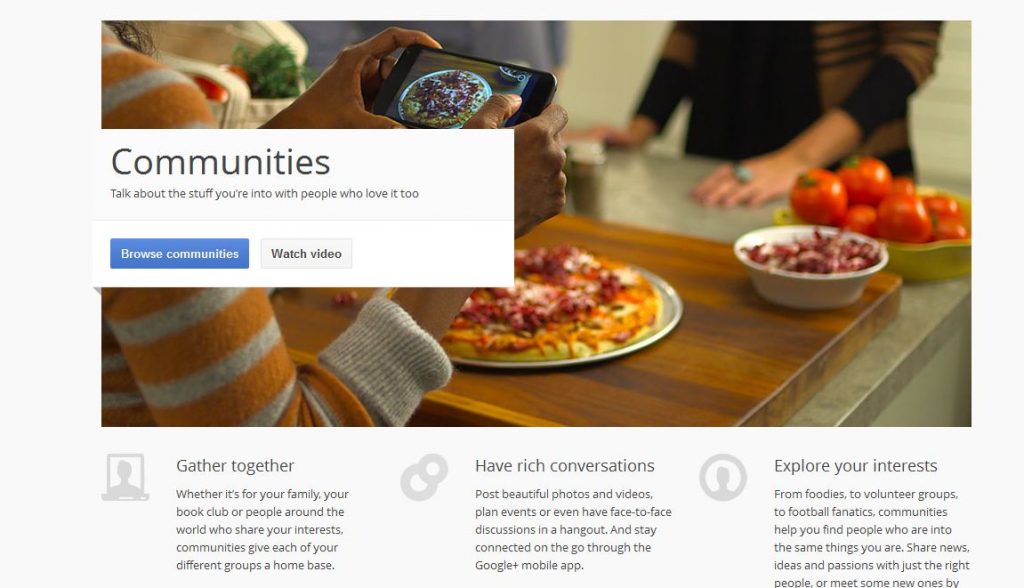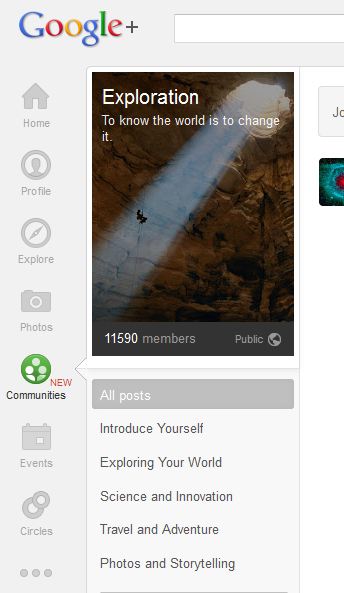Google+ Communities are a place where common interests and passions can be discussed, shared and spread to other interested users.
While managing a client’s Google + page, I happened upon the following screen shot:
Wondering what Google had thrown at us next, I dug deeper to find out what Google+ Communities are. Google+ Communities were launched as a new feature to the Google+ network on December 6. So, what are they exactly? They are most directly correlated to (and perhaps, taking on) Facebook Groups. There have also been some comparisons made to the Yahoo! Groups of old. Throw in a combinations of LinkedIn groups and Flickr Groups, and Google+ has a slick new product trying to captivate its more than 500 million users (of which we’re not sure how many are exactly active users).
Google+ Communities Official Video
Communities are not brand page specific. They can be used by both businesses and the average user. For example, if you love books, you can start or join a book community. The idea behind it is that it allows a centralized place for people with common interests to get together and share content. The Google+ Communities landing page sums up their purpose pretty succinctly:
The main purpose is for users to gather together, have rich conversations and explore interests. The goal behind it is to construct a place where common interests and passions can be discussed, shared and spread to other interested users. One function of the Communities is the ability to use the +1 button across the web, sharing content with the entire community. You can also start hangouts and plan events with other community members. Also, there are discussion categories to help you find the conversations you care about most (and avoid topics you don’t care about).
Are you worried about privacy and broadcasting your interests to the entire world? Google+ Communities offers a few different privacy options (which resembles how Facebook Groups can be set up):
- Totally Public – anyone can join, post and see the content being posted
- Public with Membership – you have to be a member to post
- Private but Discoverable – will appear in searches but that’s all
- Private – completely private, must have URL to community and can’t be found via search
So what does this new feature mean to brands and social media marketers? Will this tool be useful for your social media marketing needs?
Two brands currently embracing the Communities feature are Audi USA and National Geographic. Over 1.1 million people include Audi USA in their circles; their Google+ community, aptly named “The Audi Community,” has nearly 6,000 members. The ‘about’ description reads: “The place on Google+ for Audi fans, by Audi fans.” and that sums up the mission of Google+ Communities. You can find discussions on specific models, pictures of people’s rides and questions about the car.
National Geographic is included in over 1.6 million user’s circles and has a creatively named community called “Exploration” with over 11,000 members. Discussions range from science to travel, and an overall experience of exploring the world. It’s a great place for members to show off pictures of all the places they’ve been.
Is setting up a Google + Communities page right for your brand? As with any social media platform, it depends on the goals and needs of the brand. The feature provides a great tool for engaging users in real-time. What better way to encourage communication with your fans than to let them openly post and interact with each other – which G+ Brand Pages ONLY allow followers to comment on brand posts versus sharing content directly with the page. Users are able to arrange Hangouts and events within the community. Community Hangouts give the opportunity to host discussions, chats and more with those most interested. It’s also very multi-media friendly, which is a plus in today’s world. It’s interactive and really allows for a two-way dialogue (which again G+ brand pages are actually limiting in this regard).
One thing brands will have to take into consideration is the time and bandwidth it will take to manage a G+ Brand Page in addition to managing a G+ Community (or maybe some brands will choose one over the other?). In terms of monitoring, posting content, etc – this is TWO spaces within G+ that brands will have to be aware of. More so, brands will have to see what groups are organically formed around their brand on G+. We’ll have to see if Google will give brands the option to claim groups made by fans in the brand’s name.
While transparency is of the utmost importance, a potential negative is that member’s can post anything they want within the community (also why it’s important to have a well-moderated page). Negative posts could heat up quickly. Also, Google+ Communities aren’t so much about the brand disseminating content as it is those interested talking about it themselves. If a brand is not willing to let go of some control, then this may not be the best fit.
What’s interesting to see is that Facebook doesn’t actively promote its Groups product as a main tool for brands to use, although in some cases Facebook Groups can be a very great strategic tool to use. Our guess would namely be because everything that G+ Groups can do, Facebook Business pages can do in terms of building a community with two-way dialogue. The fact that Google is encouraging brands to have both brand pages AND groups is interesting.
Will Google+ Communities take off and leave Facebook Groups in the dust? It’s too early to tell, but we’re interested to see what happens.
Post written by Kristy Beagle aka @dancinkristy52. To learn more from Sociality Squared, become a fan!



